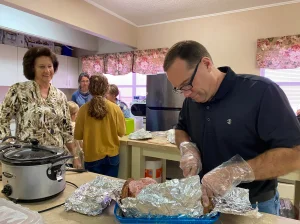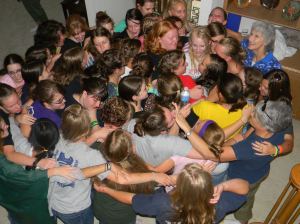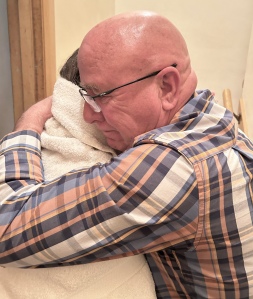#20- Taking the Family to Worship
By Kathy Pollard
When we lived just outside Richmond, VA, Michael Shepherd came and held a gospel meeting for us. One night he preached about absolute truth and said, “Even a young child understands this principle.” He stepped down from the pulpit in the middle of his sermon and walked over to where we were sitting. He pointed to our five-year-old and said, “What’s two plus two?” Our son panicked and said, “I don’t know…I’m homeschooled!” Brother Shepherd said, “Son, you just ruined my illustration.” We still laugh about that moment. And tucked away in my heart are plenty more memories from worshiping with my family:
- Slipping my young sons Cheerios one at a time to keep them still
- A handmade “quiet book” from their Grandma Pollard
- Singing “Because He Lives” the very first Sunday after having our youngest child and crying when we got to the verse, “How sweet to hold a newborn baby…”
- Their giving styles: oldest son would place his change in the basket like a normal person; middle son would sling them in there like he was skipping stones; youngest son would drop them in one. at. a. time.
- Adopted grandparents spoiling our kids
- Singing in the car on the way to worship
- A pair of red boots that each son wore after their older brother outgrew them
- A son crushing on his pre-k Bible class teacher and then getting mad at her when she got married
- A son belting out the “Ring It Out” part because those were the only words he knew in that song
- Their first times doing the Scripture reading or serving on the Lord’s table or leading a song
- Thinking how handsome they looked in their little button up shirts with freshly combed hair
- The moment in each of their lives when they said, “I want to be baptized.”
I could go on and on. It wasn’t always easy. Sometimes I felt like the service was a blur because I spent the whole time wrangling little boys. But that phase didn’t last very long and was followed by years of meaningful worship. I don’t know how it went by so fast and my heart aches with the missing of it. Now those boys are grown (still wearing boots) and leading their own families to worship. I think about what Sunday mornings in their homes must look like. I imagine it looks a lot like ours used to, trying to get everyone fed and dressed and out the door on time. Perhaps a little frazzled by the time they get in the car. They’re just getting started, and I pray they’ll give themselves some grace and soak in the moments, even the messy ones.
Worship looks a little different for me these days as Neal is the only family sitting with me on the pew. But I LOVE seeing other young families all around me and hearing their children sing. I love knowing that the whole church is my family and we always get to worship together. And I especially love it when the grand babies come to visit and I get to experience the wonder of worship through their eyes all over again.
“But as for me and my household, we will serve the Lord.”
(Joshua 24:15)











